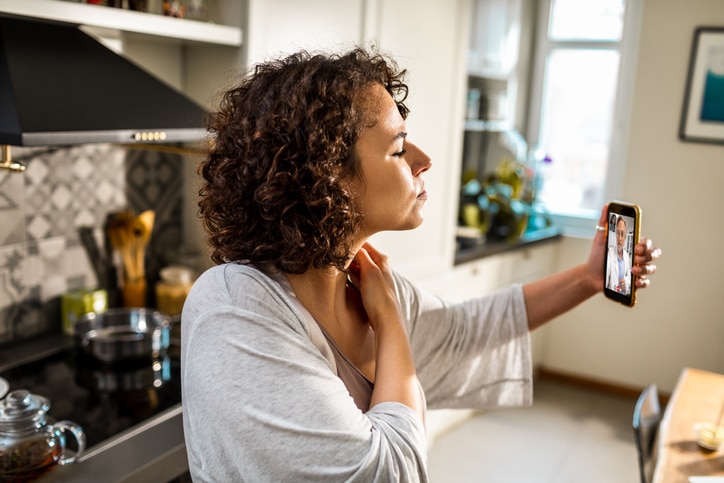Have you heard of ‘the Zoom Effect’?
Back in June 2021, a study published in the Aesthetic Surgery Journal wrote of 355 adults across Australia, who were assessed to see if increased video-use could be associated with worsening body image.
The study found that over a third of participants identified new appearance concerns while video calling, followed by a greater interest in undertaking aesthetic procedures, including Botox injections.
In an article promoting said beauty treatments, Vogue Australia wrote that before the pandemic, time spent staring at our reflections was limited, mainly to before work and during bathroom breaks.
However, during the pandemic, the world’s subsequent dependence on video calling shook up this norm.
Vogue writes on the Zoom Effect: “And as our tiny faces peered back at us from the corner of our screens, so, too, did our insecurities. In the blue, often harsh light of our computer screens, it was easy to fixate on minutiae: barely formed wrinkles, small furrows, double chins, skin that could be… better.”
Dr Vivienne Lewis, Clinical Psychologist and Assistant Professor at the University of Canberra, specialises in treating adults who struggle with body image. Over the last two years, she’s observed the significant and very real impact of the Zoom Effect, within the increasingly sought-after telehealth sphere.
While watching our faces go through the motions of laughing, yawning, behaving in ways we aren’t often privy to is unusual for all of us, Dr Lewis explains that the Zoom Effect is not as universal, and can be addressed without falling on aesthetic treatments.
She sat down with CW to break down the phenomenon from her standpoint.
“The Zoom Effect refers to when a person who already has concerns about their appearance, has these perceived flaws exacerbated by seeing them highlighted through this use of visual mediums for communication.
“I treat people with Body Dysmorphic Disorder, where they perceive a flaw in their appearance, usually on their face, and when using visual technology such as Zoom, they become extremely distressed. This can also happen when seeing themselves in photos.
“This becomes quite an issue when a person needs to use this technology for study or work. It may also stop them from engaging with friends and family, due to the distress of seeing visual images of themselves.”
Dr Lewis explains that while the Zoom era may be relatively new, the phenomenon behind the Zoom Effect is not.
“Body dysmorphic concerns have been around for a long time. The diagnosis itself is where a person perceives there is a ‘flaw’ in their appearance but nobody else sees it.
“This involves compulsive checking of one’s appearance and avoidance of situations where their appearance is on show.
“Common body dysmorphic concerns are the face, its shape and features such as the nose, eyes, and ears, as well as perceiving certain body parts to be too fat or not muscly enough.
“We know that mediums such as Zoom aren’t flattering for anyone, but for those with body dysmorphia their concerns are exaggerated.”
Dr Lewis concurred that those who are impacted by the Zoom Effect are seeking out more ways to change their appearance, “to reduce or get rid of perceived flaws”.
If you are wondering whether a new interest in an aesthetic procedure is coming from an unhealthy place, Dr Lewis says to recognise the “warning signs”.
These signs include whether the perceived flaw causes extreme distress, whether you are the only one who can see the ‘flaw’, or if you aren’t satisfied with your appearance regardless of how many procedures undergone.
Anyone needing support with eating disorders or body image issues is encouraged to contact the Butterfly Foundation National Helpline on 1800 334 673 or visit butterfly.org.au. For urgent support, call Lifeline on 13 11 14.



